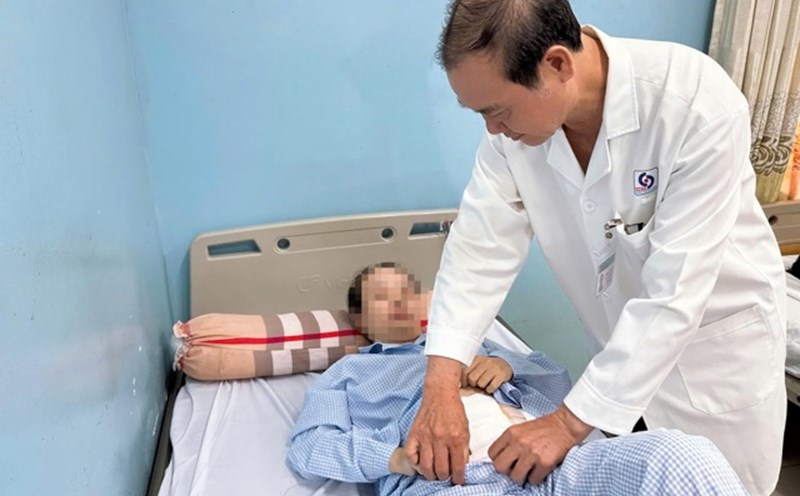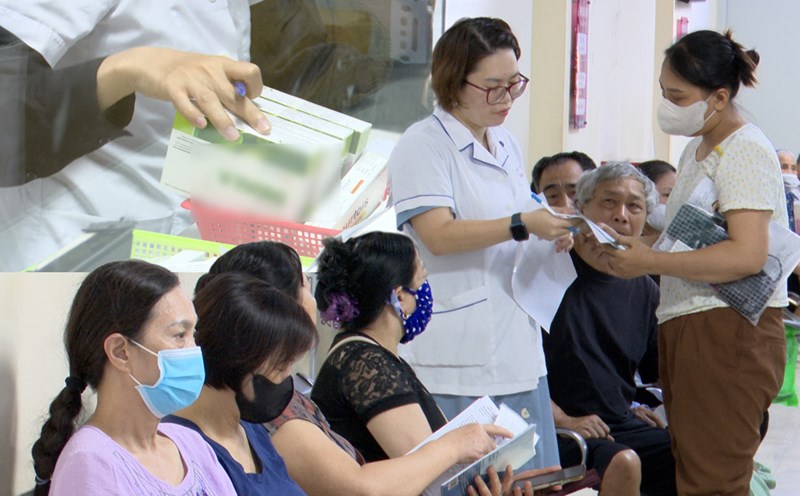3 years ago, in 2022, Ms. T.T.L.T (34 years old, Tay Ninh province) was hospitalized with poor appetite, prolonged urination, and abdominal pain. After receiving treatment at many major hospitals in Ho Chi Minh City but ineffectively, she continued to Gia Dinh People's Hospital.
Here, doctors diagnosed her with budd-Chiari syndrome, a rare disease with a rate of only about 1/100,000 - 1/2.5 million people. Normally, after blood passes through the liver, it flows through the liver veins and into the inferior vein, eventually returning to the heart. In budd-Chiari syndrome, this flow is partially blocked, leading to blockage of the liver vein due to more blood entering and exiting.
The liver becomes swollen and painful when touched, and the blockage causes fluid to leak from the liver into the abdomen, causing necklaces, one of the most common symptoms of Budd-Chiari syndrome. Like many other liver diseases, the symptoms of budd-Chiari syndrome are often not specific, meaning they are easily confused with many other diseases.
To accurately diagnose, patients need to have liver function tests (LFTs), combined with ultrasounds and CT scans. Thanks to timely diagnosis, doctors at Gia Dinh People's Hospital intervene to place a vein stent and maintain anticoagulation treatment, helping to stabilize the disease, giving Ms. T. the opportunity to return to normal life and start a family.
A year later, Ms. T. became pregnant naturally. Right from the beginning of pregnancy, Ms. T. was closely monitored, doctors adjusted the anticoagulants in each stage, and monitored the fetal development through ultrasound, Doppler's blood vessels and periodic tests.
At 38 weeks of pregnancy, when detecting slow fetal growth and reduced blood supply, doctors quickly consulted and stopped the anticoagulants in time to conduct catching surgery. Immediately after giving birth, Ms. T. was resumed with early anticoagulation to prevent thrombosis and stent blockage.
Dr. Ngo Minh Hung, Head of the Obstetrics and Gynecology Department, Gia Dinh People's Hospital, shared: "This is a very rare case. Pregnancy is a risk factor for budd-Chiari attack due to increased physiological congestion. In women who have contracted the disease, pregnancy can aggravate the disease and increase the risk of death if not treated stably. The rate of pregnancy and successful life is very low, only about 20% - 30% of women with chronic budd-Chiari can give birth, most of whom have to take anticoagulants during pregnancy. Pregnancy is also susceptible to complications such as miscarriage, stillbirth or slow growth in the uterus".
According to Dr. Ngo Minh Hung, women with budd-Chiari syndrome should only become pregnant when the disease has been controlled stably (after nong, placement, use preventive anticoagulants). When detecting pregnancy, you need to: Examination and consultation with multiple specialties ( Obstetrics - Cardiology - Hematology); Assess liver, kidney, blood clotting and ultrasound function to check the stent; convert anticoagulants to low heparin TLPT (wh) - safe during pregnancy; Closely monitor with psychomachiecal ultrasound, Doppler and regular testing; Stop anticoagulation at the right time before birth to reduce the risk of bleeding, and re-starter early after giving birth to avoid thrombosis.











